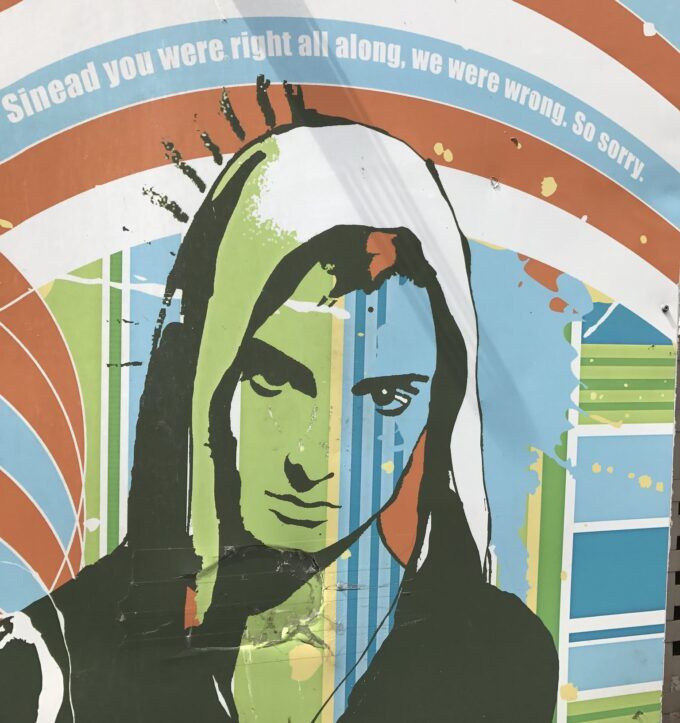
Photograph Source: Steve Terrell – CC BY 2.0
I first became aware of the incomparable Sinéad O’Connor in 1990 when I heard her sing “Nothing Compares 2 U,” a song by Prince that Sinéad made her own—without Prince’s blessing—but with eyes that saw right through you and a voice of silvery gold.
That voice reminded me of Joan Baez singing like an angel crying out against the wars, but more tormented because Sinéad was tortured, abused, probably by a priest or a nun or her mother. Most definitely by our world.
Her delivery was so intense, haunting, accusatory and yet so vulnerable, that as soon as I heard it, like millions around the world, I fell in love with her.
So did my husband Max. And as we fell in love with Sinéad, we fell in love with each other. We were already bonding through our opposition to war in general and Desert Storm (when it was still Desert Shield) in particular, and together we made a cassette tape (remember those?), Desert Susan, in the spirit of Tokyo Rose with a pinch of Scheherazade. We sent a few hundred cassettes to the troops and officers of Desert Shield and Storm to persuade them to “make love not war.” I talk about the wisdom of the much-maligned “Vietnam Syndrome,” the folly of war and the beauty of love in between musical interludes, and the first song on the tape is Sinéad O’Connor’s “Nothing Compares 2 U.”
To whom was she singing in that song? Her lover who left her? Maybe they broke up, or he died, or perhaps he went off to war, and she yearns for him to return in peace.
We yearned for all of them to return in peace, but they didn’t, though when they thought they “won,” they held a big parade. Then one Gulf War led to another, with terrible sanctions in between, and the Perma Warscontinued and continue. At least, over the years, Max and I have heard how those Desert Susan tapes featuring Sinéad turned some of those troops and officers to turn their swords into plowshares—or maybe floggers—and make love, not war. We’ve even met a few of them.
Then in 1992, the year Max and I got married, Sinéad O’Connor went on Saturday Night Live, sang out like a seer in that precious metal voice, and then she ripped up the Pope—actually her mother’s photo of Pope John Paul II—telling us to “Fight the Real Enemy.” In that moment, she was incandescent, a Joan of Arc for our times, and I fell even harder in love with her, as the fires burned around her.
Some claim now that nobody knew then that Catholic priests were molesting altar boys and girls en masse, but a lot of us knew, though many didn’t want to know, and poor Sinéad, like Joan, burned and suffered on the stake of society’s willful sexual ignorance.
The pope-ripping caused Sinéad to get canceled before cancelling was a thing. A few days later, she was booed at a concert by seemingly everyone but Kris Kristofferson, and it seemed that her brilliant career had been flushed down the Vicar’s drain.
But Sinéad was never sorry for what she did. She admitted she struggled with bipolar disorder and PTSD all her life, but in that moment, she was the sanest person on the planet. It was what she was destined for, to tell that truth about Catholic priests abusing the most vulnerable members of their flock when it was unpopular to say so, and I loved her for that. Now everyone loves her for that (well, almost everyone).
Then, almost two decades later, in 2013, I felt the pain of seeing someone I love do something I despise—as dramatically as she did the things I loved. Sinéad O’Connor wrote a scolding, slut-shaming open letter to Miley Cyrus about being too sexual and too “naked” in her Wrecking Ball video. She wrote that Hollywood was making a “prostitute” out of Miley, and not in a good way—whether Miley’s outfits and dance moves were Miley’s idea or not. When Sinéad slut-shamed Miley so fiercely and publicly, she slut-shamed me, and all of us who choose to wear erotic outfits or nothing at all—and I hated her for that… perhaps especially because I had loved her so much before.
Another Counterpunch writer, Ruth Fowler, wrote an article at the time that expressed my feelings about that awful letter much more eloquently and humorously than I ever could. Apparently, Sinéad read Ruth’s article and freaked out, called CP editor Jeffrey St. Clair and “unloaded” on him for 40 minutes, demanding that he fire Ruth. He didn’t fire Ruth, but he did suggest Sinéad write a piece for Counterpunch, which she did—and I loved her for that.
She took a few other important and unpopular positions, like supporting the Palestinians, turning down a Grammy as too “commercial,” and opposing all the wars. Though I’m still repelled by her slut-shaming, there was a lot to love about Sinéad O’Connor.
Her youngest son died by suicide a year ago, and I can’t even conceive of the immense pain and harrowing loneliness she went through over that, though I sometimes imagine her singing Prince’s song to her lost boy. Through all of her suffering, she gave us so many gifts of love, until she couldn’t anymore, and now at the young age of 56, she’s gone.
Thank you for everything, Sinéad O’Connor. Nothing compares to you.
This content originally appeared on CounterPunch.org and was authored by Susan Block.